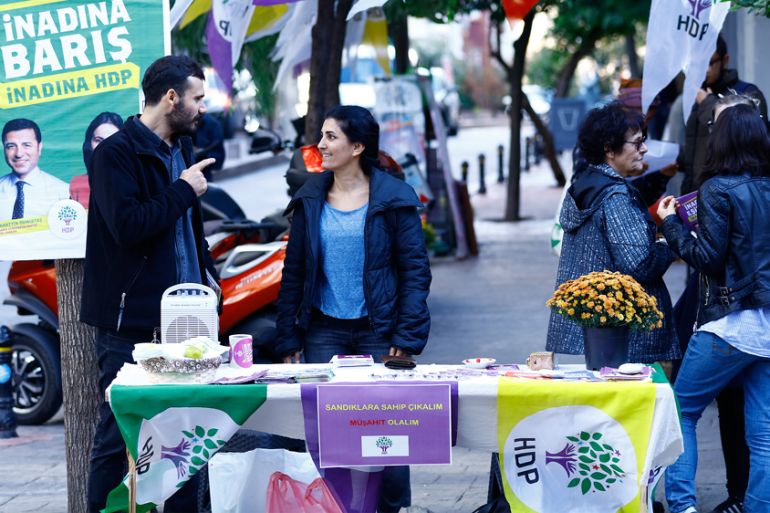HDP: Party of Turkey’s oppressed?
In a three-part series, Al Jazeera examines the parties contesting Turkey’s upcoming elections.

Istanbul – Savas Cicek believes that the Peoples’ Democratic Party (HDP) represents the oppressed people of Turkey and fights for their rights.
“In a system dominated by the same conventional parties for ages, this party has become a new option for the disadvantaged groups in this society – from minorities to students,” the 27-year-old student tells Al Jazeera as he works as a volunteer at an HDP stand located close to Istanbul’s central Taksim Square.
Another student, Gamze Ozgur, 26, also volunteering at the same stand, concurs: “The results of the latest polls were a reaction to conventional politics, both to the government and the opposition parties, who do not push for the demands of a large segment of the society.”
RELATED: AK voters: Our party took Turkey to a different level
HDP volunteers have been working hard across Istanbul ahead of the snap parliamentary polls on November 1.
The June 7 elections removed the socially conservative Justice and Development Party (AK party) from its 13-year-old single-party government, but failed to provide a coalition government, leading to the announcement of the upcoming polls.
The elections are to determine the country’s direction at a critical juncture. Multiple bomb attacks have targeted political rallies and claimed scores of lives. The Turkish society is becoming increasingly polarised in the backdrop of an escalated armed conflict between the army and the outlawed Kurdistan Workers’ Party (PKK).
Ironically, one of the bloodiest periods in the country’s 30-year-old Kurdish dispute takes place at a time when the pro-Kurdish party is said to have achieved unmatched electoral success in Turkey’s political history.
The HDP won 13.1 percent of the votes, sending 80 MPs to the 550-member parliament. With this result, it has become the first pro-Kurdish movement to enter parliament as a political party, rather than through independent candidates – a method used to get over Turkey’s unusually high 10-percent electoral threshold.
“Now that the HDP has passed the threshold once, people have seen it can be done. Support for the party will increase,” Yakup Efe Tuncay, a 30-year-old translator who supports the HDP, told Al Jazeera.
|
|
HDP pundits say their party promotes democratic rule, social equality, human rights, and social welfare, apparently seeking to attract liberal votes in the western part of the country, and votes from non-Kurdish minorities, in addition to its Kurdish voter base.
Selahattin Demirtas, the co-leader of the party, is highly popular with young liberals in Turkey due to his sharp jokes, his approachable personality, and his harsh tone of opposition when dealing with the governing party.

“The HDP is a much more colourful party compared to previous pro-Kurdish parties. And Selahattin Demirtas has a big role in this as an intelligent, sympathetic, and charismatic leader,” Ozgur, the student, told Al Jazeera.
Critics and government officials say the party does not put enough effort to influence the PKK to lay down weapons. Some even say that the HDP officials usually act under pressure from the outlawed group.
Government officials have repeatedly pointed out the significance of the current Kurdish representation in the parliament through the HDP, stressing that the PKK broke the ceasefire after the June 7 polls despite this new dynamic.
The HDP secured over one million of the 10 million votes in Istanbul, more than double what it achieved in the local polls in 2014, pooling votes from different parts of society.
The party achieved great success in conservative working class Istanbul neighbourhoods with high numbers of Kurdish immigration from the country’s southeast, as well as in wealthy, predominantly secularist neighbourhoods.
Ayse Erdem, the co-chairperson of the HDP’s Istanbul branch, defines her party as a “political party of diversity, bringing together people with different beliefs and identities”.
“The party is supported by various civil movements, such as women’s rights, environmental, and leftist groups. So, their bases are added to the Kurdish base, carrying the party to a far larger audience than the previous pro-Kurdish parties,” Erdem said.
RELATED: Turkey ponders HDP’s role in Kurdish peace process
Since the June polls, the country saw the deaths of dozens of security personnel in PKK attacks after a ceasefire, in place since 2013, was broken in July.
The Turkish army says that over 1,000 PKK members have been killed in air strikes targeting the group in Turkey and northern Iraq.
|
|
The government, which was in talks with the imprisoned leader of the PKK until the ceasefire fell, often blames the HDP for its close links with the group.
In early October, Turkey also experienced the worst bomb attack on its territory in the country’s modern history. More than 100 activists were killed in the capital Ankara at a peace rally, which was backed by the HDP.
Prime Minister Ahmet Davutoglu said “it was highly probable” that “both the PKK and the Islamic State of Iraq and the Levant [ISIL] played an active role” in the suicide bombing.
A similar attack targeting activists at a Turkish border town near Syria in July killed over 30 people and was blamed on ISIL by the government.
It was later revealed that two ISIL-affiliated brothers were involved in both attacks.
RELATED: Interactive: Turkey decides
An HDP rally was also bombed two days before the June 7 polls, killing four people and injuring over 100. And there were attacks on HDP headquarters in different parts of Turkey.
Weeks before the polls, the party canceled all public election rallies amid security threats.
Erdem believes the threats against the HDP will make voters support the party even more. “Our people die, get wounded or arrested. Our buildings are attacked. We cannot even hold rallies. Voters see this, and they will react to it with more support,” she told Al Jazeera.
Follow Umut Uras on Twitter: @Um_Uras